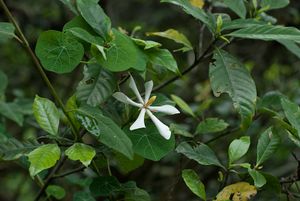Note: This is a project under development. The articles on this wiki are just being initiated and broadly incomplete. You can Help creating new pages.
Gardenia jasminoides - Gandhraj
Gardenia jasminoides is an evergreen flowering plant of the family Rubiaceae. It originated in Asia and is most commonly found growing wild in Vietnam, Southern China, Taiwan, Japan, Myanmar, and India.
Contents
[hide]- 1 Uses
- 2 Parts Used
- 3 Chemical Composition
- 4 Common names
- 5 Properties
- 6 Habit
- 7 Identification
- 8 List of Ayurvedic medicine in which the herb is used
- 9 Where to get the saplings
- 10 Mode of Propagation
- 11 How to plant/cultivate
- 12 Commonly seen growing in areas
- 13 Photo Gallery
- 14 References
- 15 External Links
Uses
Headache, Dyspepsia, Nervous disorders, Fever, Febrifuge, Kidneys problems, Pimples, Lungs problems, Sore throats
Parts Used
Chemical Composition
Trimethoxyflavone, tetrahydroxy, dymethoxyflavone, kaempferol, quercetin, 3beta, dihydroxyurs, oic acid [1]
Common names
| Language | Common name |
|---|---|
| Kannada | Suvasane malle |
| Hindi | Gandhraj |
| Malayalam | |
| Tamil | |
| Telugu | |
| Marathi | NA |
| Gujarathi | NA |
| Punjabi | NA |
| Kashmiri | NA |
| Sanskrit | |
| English | Gardenia, Cape jasmine |
Properties
Reference: Dravya - Substance, Rasa - Taste, Guna - Qualities, Veerya - Potency, Vipaka - Post-digesion effect, Karma - Pharmacological activity, Prabhava - Therepeutics.
Dravya
Rasa
Tikta (Bitter), Katu (Pungent)
Guna
Laghu (Light), Ruksha (Dry), Tikshna (Sharp)
Veerya
Ushna (Hot)
Vipaka
Katu (Pungent)
Karma
Kapha, Vata
Prabhava
Habit
Identification
Leaf
| Kind | Shape | Feature |
|---|---|---|
| Simple | The leaves are divided into 3-6 toothed leaflets, with smaller leaflets in between |
Flower
| Type | Size | Color and composition | Stamen | More information |
|---|---|---|---|---|
| Unisexual | 2-4cm long | Yellow | 5-20 | Flowers Season is June - August |
Fruit
| Type | Size | Mass | Appearance | Seeds | More information |
|---|---|---|---|---|---|
| 7–10 mm (0.28–0.4 in.) long pome | Clearly grooved lengthwise, Lowest hooked hairs aligned towards crown | With hooked hairs | {{{6}}} |
Other features
List of Ayurvedic medicine in which the herb is used
Where to get the saplings
Mode of Propagation
How to plant/cultivate
Originally a species from warm temperate climates, in tropical areas it grows well, at altitudes of 400 - 1,200 metres[3]
Commonly seen growing in areas
Warm temperate area, Subtropical area, Borders of forests and fields.
Photo Gallery
References
External Links
- Ayurvedic Herbs known to be helpful to treat Headache
- Ayurvedic Herbs known to be helpful to treat Dyspepsia
- Ayurvedic Herbs known to be helpful to treat Nervous disorders
- Ayurvedic Herbs known to be helpful to treat Fever
- Ayurvedic Herbs known to be helpful to treat Febrifuge
- Ayurvedic Herbs known to be helpful to treat Kidneys problems
- Ayurvedic Herbs known to be helpful to treat Pimples
- Ayurvedic Herbs known to be helpful to treat Lungs problems
- Ayurvedic Herbs known to be helpful to treat Sore throats
- Herbs with Fruits used in medicine
- Herbs with Leaves used in medicine
- Herbs with common name in Kannada
- Herbs with common name in Hindi
- Herbs with common name in English
- Habit - Shrub
- Index of Plants which can be propagated by Seeds
- Index of Plants which can be propagated by Cuttings
- Herbs that are commonly seen in the region of Warm temperate area
- Herbs that are commonly seen in the region of Subtropical area
- Herbs that are commonly seen in the region of Borders of forests and fields
- Herbs
- Ayurvedic herbs that don't have seed photos
- Rubiaceae





